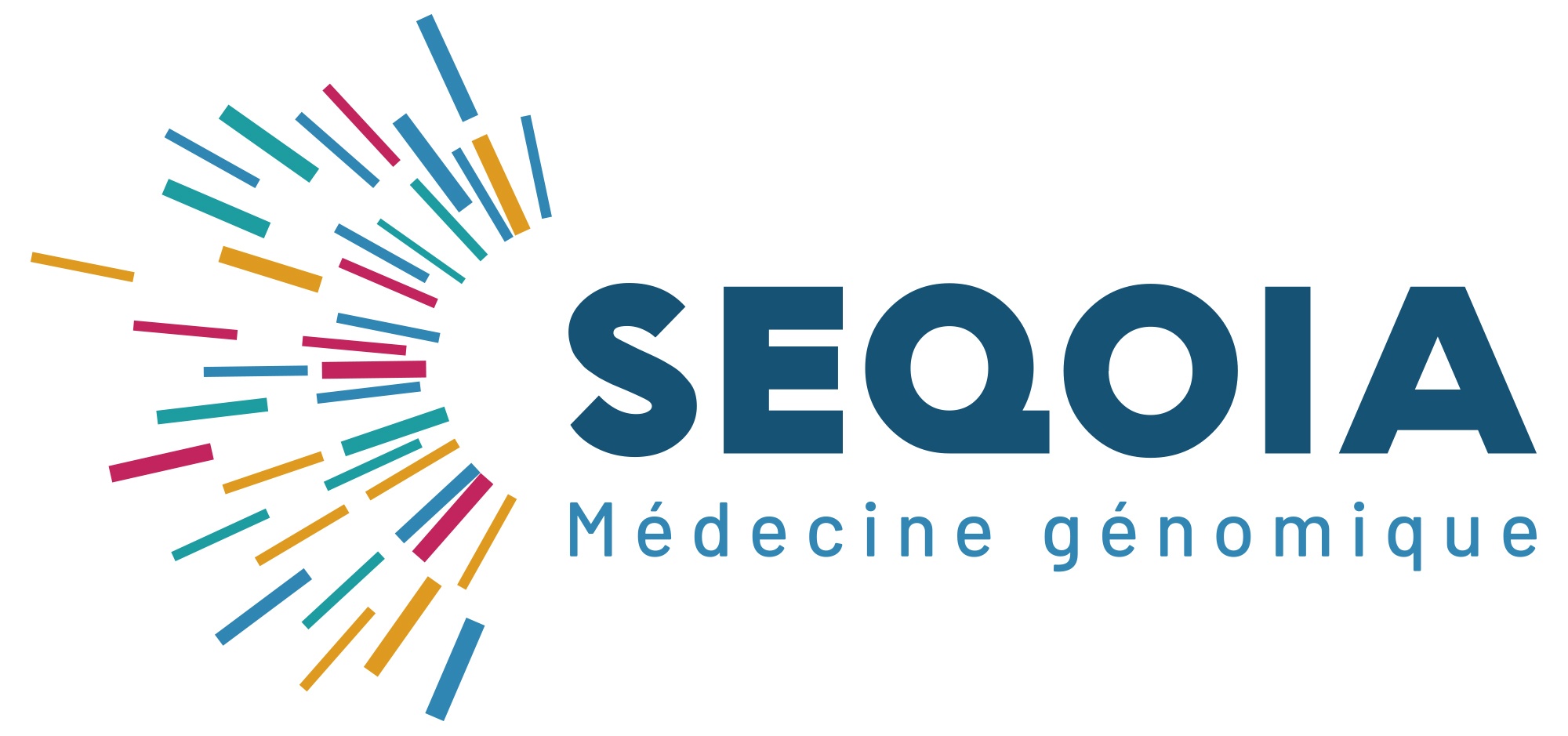PUBLICATIONS SCIENTIFIQUES
La charte de publication du Plan France Médecine Génomique 2025 est disponible en cliquant ici.
Concernant la signature des publications sous forme de case report, les règles sont les suivantes :
1) Prendre contact avec le GCS SeqOIA : seqoia@laboratoire-seqoia.fr
2) Les biologistes qui signent le case report indiquent leur double affiliation (LBM SeqOIA et leur laboratoire d’origine)
3) Signature en nom propre de l’un des membres de l’équipe SeqOIA-IT
CASE REPORTS DÉJÀ PUBLIÉS
- Genome maps across 26 human populations reveal populations-specific patterns of structural variation (10/2019)
- VPS4A mutation in syndromic congenital hemolytic anemia without obvious signs of dyserythropoiesis (12/02/21)
- Heterozygous variants in ZBTB7A cause a neurodevelopmental disorder associated with symptomatic overgrowth of pharyngeal lymphoid tissue, macrocephaly, and elevated fetal hemoglobin (13/09/21)
- Adult Cerebellar Ataxia, Axonal Neuropathy, and Sensory Impairments Caused by Biallelic SCO2 Variants (12/21)
- The clinical and molecular spectrum of QRICH1 associated neurodevelopmental disorder liste (11/12/2021)
- Biallelic AOPEP Loss of fonction variant cause progressive dystonia with prominent limb involvement (01/22)
- Autosomal Recessive Cerebellar Atrophy and Spastic Ataxia in Patients With Pathogenic Biallelic Variants in GEMIN5 (28/02/22)
- Clinical Genetics: Biallelic variants in ZNF142 lead to a syndromic neurodevelopmental disorder liste (16/05/22)
- Oral Phenotype of Singleton–Merten Syndrome: A Systematic Review Illustrated With a Case Report (09/06/22)
- Biallelic pathogenic variants in roundabout guidance receptor 1 associate with syndromic congenital anomalies of the kidney and urinary tract (05/22)
- Everolimus and Lenvatinib in a Kidney Metastatic Epithelioid Angiomyolipoma (08/07/2022)
- Contribution of whole genome sequencing in the molecular diagnosis of mosaic partial deletion of the NF1 gene in neurofibromatosis type 1 (19/07/2022)
- Phenotypic and genetic spectrum of ATP6V1A encephalopathy: a disorder of lysosomal homeostasis (27/08/2022)
- Neurodevelopmental and Epilepsy Phenotypes in Individuals With Missense Variants in the Voltage Sensing and Pore Domain of KCNH5 (28/10/2022)
- Monoallelic CRMP1 gene variants cause neurodevelopmental disorder (13/12/2022)
- Overcoming the challenges associated with identification of deep intronic variants by whole genome sequencing (27/01/23)
- Adenoid cystic carcinoma of Bartholin's gland, a case report with genomic data and literature review (07/02/2023)
- Deficiency of the minor spliceosome component U4atac snRNA secondarily results in ciliary defects in human and zebrafish (28/02/23)
- Olaparib in the Setting of Radiotherapy-Associated Sarcoma: What Can Precision Medicine Offer For Rare Cancers? (27/02/2023)
- Deficiency of the minor spliceosome component U4atac snRNA secondarily results in ciliary defects in human and zebrafish (28/02/23)
- Bi-allelic SNAPC4 variants dysregulate global alternative splicing and lead to neuroregression and progressive spastic paraparesis (22/03/2023)
- UBTF tandem duplications define a distinct subtype of adult de novo acute myeloid leukemia (21/04/2023)
- First reports of fetal SMARCC1 related hydrocephalus (05/06/2023)
- Molecular-based targeted therapies in patients with hepatocellular carcinoma and hepato-cholangiocarcinoma refractory to atezolizumab/bevacizumab (28/08/2023)
- ATP2B2 de novo variants as a cause of variable neurodevelopmental disorders that feature dystonia, ataxia, intellectual disability, behavioral symptoms, and seizures (04/09/2023)
- Genome sequencing identify chromosome 9 inversions disrupting ENG in 2 unrelated HHT families (12/02/2024)
ARTICLES PUBLIÉS SUITE AU SÉQUENÇAGE EXCEPTIONNEL RÉALISÉ PAR SEQOIA DANS LE CADRE DE LA CRISE COVID-19
- Accuracy of saliva and nasopharyngeal sampling for detection of SARS‑CoV‑2 in community screening: a multicentric cohort study (31/05/21)
- Evaluation of a saliva molecular point of care for the detection of SARS-CoV-2 in ambulatory care (26/10/21)
- Rare predicted loss-of-function variants of type I IFN immunity genes are associated with life-threatening COVID-19 (05/04/2023)
